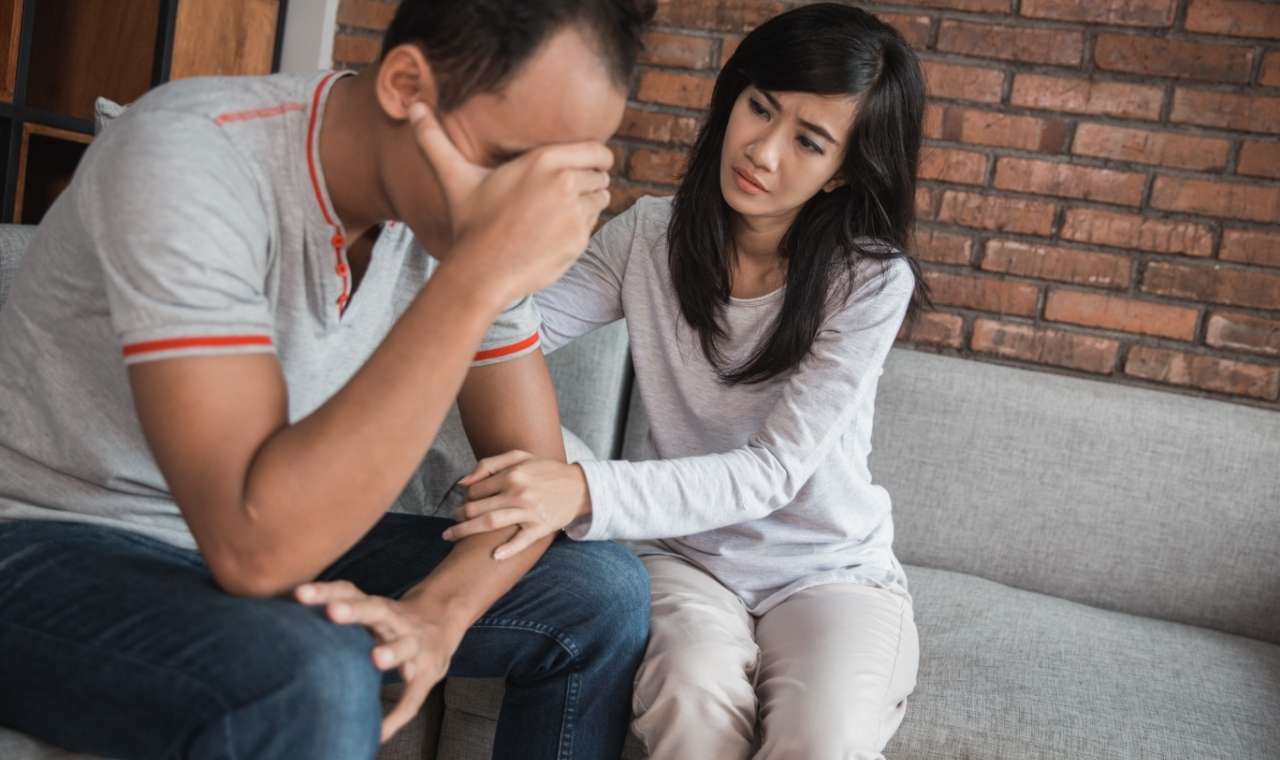People experiencing depression need support, but how do you even know if someone is depressed? Here we will explore how to identify if your spouse is depressed and provide you with the information on how to deal with a spouse with depression. There are a number of healthy ways one can deal with depression. These include:
- Seeking therapy
- Getting them to open up about emotions
- Giving them support in the areas of life that may be overwhelming them
Signs To Look Out For if You Think Your Spouse Is Depressed
There are a number of things you can look out for if you think your spouse could be depressed. Have you noticed sudden changes in their everyday habits? This is often an early sign of depression. You may notice things like different eating and drinking habits or that their behavior is now more sullen. You may notice them trying to avoid contact with you or they start doing all kinds of hobbies and activities they wouldn’t usually engage in. There may also be compulsive behavior that includes spending money often or buying more expensive things.
Your partner may also start to exhibit the following behavior:
- Lack of energy
- Loss of interest in activities they love
- May seem angrier
- May cry often
- Lose focus or concentration easily
- Spend more time sleeping
- Have problems falling and staying asleep
- Start drinking or drink more than usual
- Begin to abuse drugs
- Have a loss of interest in sex
How You Can Avoid the Vicious Circle
If your spouse is exhibiting angry outbursts or withdraws from you, this can leave you feeling hurt and alienated. This may even cause you to react with like behaviors. If this happens it can end up with you both in a vicious cycle which can lead to further depression in your spouse and may even spark a case of depression in you.
Dealing with a depressed partner is hard, but try to remember they aren’t being malicious. It is really the depression that is exhibiting these symptoms and mannerisms. The best thing is that depression can be treated so it won’t last forever. Most couples do survive a bout of depression in one partner and you and your spouse can be one of those success stories.
If you are considering a family intervention, we want you to be very careful about this. You never want to approach your spouse in an accusatory manner. Instead, you want to tell them what you have noticed about their changed behavior. You can tell them they seem more unhappy and ask them to share their feelings. If there are behavior changes that hurt you, you really should also let them know.
The Denial Response

When approached, your spouse may deny that they have a problem. Often individuals who are suffering from depression or who have mental health issues think their loved ones want to “fix” them and they don’t want to be “fixed”at all. Sometimes they just need a listening ear, if while you are listening you hear things that are too hurtful for you to process, we suggest turning to a professional.
If your spouse is acting out with spending, alchohol consumption, sex or drugs, they may tell you they need this to ease their stress. You should encourage them to get help from a professional to diagnose or rule out depression as the root cause of their behavior change.
They can begin with talk therapy. Make an appointment to see a mental health professional such as a psychologist, counselor, or psychiatrist.
Help from a professional plus medication is known to work for people who are depressed. The combination has been proven to work better than simply medication alone. Medication can be the most appropriate treatment for those suffering from severe depression
You can choose to have therapy with your spouse especially if the depression is causing issues with the marriage. Your partner may not want this option or may want to have some solo therapy before including you in sessions. If they are struggling with addiction, they will need to tackle that problem before they can work on their depression.
It is important to remember that there is no quick fix for depression. Some people may take a particular medication that doesn’t work for them or they may engage in therapy and it doesn’t seem to work, but the key is to be persistent in the treatment method chosen.
The Impact of Positivity and Physical Activity

If your spouse refuses to go to therapy, do not start feeling hopeless right away. Stay positive and do the things that you can do without therapy. You can’t force them into therapy but you can still help them to improve their mood.
Give your spouse all the affection they need even though you may experience rejection initially. Remember their behavior is because of depression. Be sure to encourage them and invite them to engage in activities that you can both enjoy together. Exercise is known to help with depression but you don’t have to go to the gym. Go for a walk, go for a swim at the pool or go on a trip to the beach.
Here are a couple of things you should avoid if your spouse doesn’t want to go to therapy:
- Blaming them
- Attacking them because of their behaviors
- Repeatedly telling them what they did that made you feel bad
- Bargaining with them
- Taking an all-or-nothing approach
Here are some things you can do instead:
- Attend outdoor events
- Listen to music
- Read to each other
- Go out with friends
Practice Self-Ccare
When you have a depressed spouse it can be very draining on you and so you must take care of yourself. Here are a couple of tips that can help you to remain physically and emotionally healthy.
- Engage in regular exercise
- Get adequate amounts of sleep
- Eat a balanced, healthy diet
- Check out self-help books on related topics that can be helpful to both you and your spouse
Remember not to think of your spouse’s depression as a reflection of your self-worth. Though their depression can feel very personal, you are not held responsible for it. You shouldn’t blame yourself and if you start doing that you should seek the help of a mental health professional for your own well-being too. It does occur often enough where both partners can be depressed and there may be multiple issues contributing to the depression that can only be unpacked and dealt with in therapy.
How To Help Your Depressed Spouse

You have always wanted to love and support your partner, now that they are depressed they need that love and support more than ever. It is easier to maintain a good connection when both you and your partner are experiencing good mental health. Emotional issues can test even the strongest relationships so don’t approach the situation with a negative mindset.
A relationship is continuous work. You always need to be working on communicating better and keeping the passion alive. You also need to work on yourself to ensure you are bringing the best you to the relationship. Every relationship takes effort but one with a depressed spouse will require even more attention.
You can feel isolated living with a depressed spouse but you are not the only person on the planet dealing with a situation like this. On average 16 million Americans are currently dealing with depression. Also remember it affects people of any gender or age.
Causes of Depression
The exact cause of depression is still unknown but medical professionals believe that it is a result of a combination of psychological, environmental, and genetic factors. So your spouse could be depressed because it’s in their DNA or they could be going through a rough and stressful period.
The causes of depression vary from one person to another and can differ from men to women as well. Women are twice as predisposed to be diagnosed with depression than men. This is due to hormone levels before and after pregnancy or before and after menopause. There are also cultural differences that can contribute to depression being higher in women than men. Women performing work duties and still having the duties of home to contend with can find life overwhelming and that can trigger depression.
Men are less encouraged to talk about their feelings and this may be the reason there are fewer reported cases of depression in men. Men often have less social support and can find it hard to identify and express their feelings and emotions. Men most often isolate themselves and this makes the situation even worse.
Do you struggle with depression?
We have clinicians expert on depression, feel free to read about them, or book a free consultation to review your situation.
No matter what causes your partner’s depression, it is important for them to know that you are there for them in full. Be gentle as they struggle while you both work towards being healthy and happy again.
Ways to Support Your Depressed Spouse

Be Present
One of the easiest and most critical ways to support your depressed spouse is to be present. And it’s not simply about listening, you must practice deep listening. Make sure you are truly present with no distractions. Be sure you are not doing anything else and keep eye contact with your spouse. Provide nonverbal feedback as your spouse speaks which will help to relieve any feelings of isolation they may be having.
Communicate Deeply
Communication is of utmost importance when dealing with a depressed spouse. Use a loving tone when speaking and let your spouse know you are there to support them however they need it. Let them speak without interruption and never pass judgment. It can be hard and sometimes you may have to wait a day or two to get back to a particular subject, but deeper communication sometimes means letting it go when it is getting out of hand or overwhelming for either of you.
If your spouse is a male, it is important to remember they may find it harder to verbalize their feelings. Help your spouse to understand you are coming from a place of concern and not judgment. Remain in the moment, remain honest about your feelings, and make the effort to understand their point of view.
Make Social Connections
According to the American Psychological Association, men are 4 times more likely to commit suicide. Oftentimes isolation is a major contributing factor to suicidal thoughts. Men often depend on their partners for social connections. For these individuals, you want to make an effort to get them out of the house and around more people that care about them.
Ensure he doesn’t get the chance to isolate, make any effort you can to get him out of the house. If he is spending more time with work acquaintances this may be a cry for social support and he needs to be around his loved ones that can provide the advice and empathy he needs to deal with his depression.
Get Outside and Get Active
Physical activity has been proven to have a positive effect on individuals suffering from depression. With a simple change in your partner’s physiological state, you can incredibly improve their mood. Take a walk around your neighborhood if they would rather not go to the gym. Whatever activity they choose, be sure to do it with them.
Positive Reinforcement is Important
Your spouse may be suffering from low self-esteem while they are dealing with depression. Do not push your partner to accomplish more, but let them know how proud you are when they make an effort no matter how small. Celebrate the accomplishments so they can feel better about themselves during the process.
Depression is a Part of Life
We all go through depression throughout our lives at one point or another. Many people are afraid to be seen as depressed because of the stigma that is attached to it. Everyone’s mental health is affected by day-to-day tasks in one way or another. You are not alone and your spouse isn’t alone either. There are resources out there to help you and your family get back to good mental health.
How to Live with Your Depressed Partner
Some days, your life can feel like a roller-coaster ride. Your Partner can move from feelings of productivity and happiness to sadness and lethargy. Some days what you do or say can sway them either way. To you, life may feel unpredictable but you can keep a good amount of peace at home by employing the following.
Create a Home Environment with Low Stress
A home environment that is low in stress can really help your depressed spouse. Get chores out of the way so they don’t leave obvious clutter around. This could mean washing dishes before they pile up in the sink and the same applies to laundry. Establish routines so you can make better use of your free time to spend it supporting your spouse.
Establish Healthy Routines
You will need to pay attention to health and exercise, but in addition to that, you want to ensure that you have other healthy routines as a part of your day. Meditation is known to regulate mood and improve relationships. You can also opt for other health routines such as:
- Getting enough sleep
- Engaging in yoga
- Starting a journal
- Practicing daily gratitude
Don’t Forget to Take Care of Yourself
You can never forget about taking care of yourself, although you likely will. We want to remind you now that taking care of YOU is very important. If you want to help your spouse, they need a strong person to help them get out of their dark place. Selfcare will allow you to properly take care of yourself so your stress levels are reduced. This will ensure that you are in the best state to take care of your spouse.
Practice Gratitude
It is easy to give in to fear when in a stressful situation such as dealing with a depressed spouse. But you can shift your focus to one of gratitude and you’d be amazed to see how this can create more abundance in your life. Practice gratitude daily and in every aspect of your life. Look for the good in everything and remember all the positive qualities of your partner that made you choose them in the first place.
16 Questions to Ask Your Depressed Partner
These questions aren’t to diagnose your partner but they can help to see how much impact the depression is having on their life. The answers to these questions can help you determine if your partner’s symptoms are overwhelming them and causing strain.
- Are you having trouble falling asleep or staying asleep?
- Do you find yourself sleeping more than you usually would?
- Have your eating habits/patterns changed?
- Do you taste your food when you are eating?
- Are you feeling tired even though you are sleeping as much as or even more than you usually do?
- Do you find enjoyment in things you previously enjoyed?
- Is it hard for you to complete personal grooming tasks?
- Are you thinking of your own death?
Remember that there is a big difference between feeling down and clinical depression. These questions can help to determine one from the other. Ask these questions even if you already know the answers. Their answers can help you to determine if they notice the changes or are living in denial.
Now here are another set of questions you can ask that will help and support your spouse.
- What was helpful the last time you felt this way?
- How can we work as a team to get through this rough spot?
- Can you tell me how best I can help you?
- Have your medications provided any relief, are you feeling any differently?
- Is there anybody I can call to help us get through this tough time?
- What do you need me to do?
- How do you need me to help?
- What are some changes we can make to help you feel better?
Here are some questions you will need to ask yourself:
- Are you getting enough sleep each night; 7 to 9 hours?
- Have you started to use drugs or alcohol to help you cope with the stress?
- Are you consuming a healthy diet?
- Do you experience insomnia, headaches, or digestive issues since your partner’s behavior changed?
- Do you have someone to talk to about what you are going through?
- Are you aware of the resources available to you and how to access them?
Be truthful in your answer to these questions and remember, you have to take care of yourself first before you can take care of your spouse.
QA
- Why are you making a big deal out of something so small?
- Do you see how lucky you are?
- Are you feeling better now?
- What is wrong with you?
- What do you even have to be depressed about?
Never try to trivialize what your partner is going through? It may work for someone who is feeling just a little stressed out or blue but it could really push a depressed person further into depression or draw out their aggressive side.
Always think before you speak and choose to use language that will validate their feelings. Your partner will in turn feel supported as well as understood. This can help to get them out of their depressive state.
Can Depression Affect Intimacy Causing a Relationship to Break Up?
Depression can cause you to withdraw into your own cocoon where it’s all despair inside. It is easy for both partners to emotionally check out when their partner is experiencing depression. Depression is draining to the person suffering from it and the family members and loved ones that have to care for and support that individual. And, depression affects every aspect of life including self-esteem, libido, sleep, appetite, and energy levels to name a few.
So yes, depression can affect one’s intimacy and it can be the cause behind a breakup, but it doesn’t have to be. If you know how to deal with a spouse with depression, there is hope for your relationship. The first step is finding the help you need.
Do you struggle with Depression?
We have clinicians expert on Depression, feel free to read about them, or book a free consultation to review your situation
Do you struggle with depression?
We have clinicians expert on depression, feel free to read about them, or book a free consultation to review your situation.